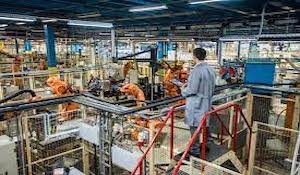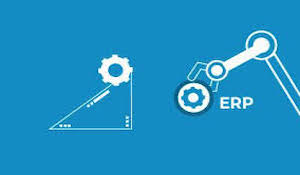Optimizing and Streamlining Manufacturing Operations
Manufacturing material planning and production scheduling are crucial aspects of efficient and effective manufacturing operations. These processes...
3 min read
 Murray Quibell
Jul 18, 2023 7:57:53 PM
Murray Quibell
Jul 18, 2023 7:57:53 PM

Cloud-based Enterprise Resource Planning (ERP) technology can be a game changer for manufacturers looking to stay competitive in today's market. The latest manufacturing trends in ERP implementation include greater automation, digitalization, globalization, sustainability, and the need for real-time data analytics. In this article, we will explore the many compelling reasons why cloud ERP is a smart choice for manufacturers seeking to thrive in a rapidly changing industry.
Increased Automation: Cloud ERP systems offer built-in automation capabilities that streamline and optimize manufacturing management processes. With automation, manufacturers can improve efficiency, reduce costs, and minimize errors. Cloud ERP enables seamless integration with other manufacturing systems, such as robotics, IoT devices, and machine learning algorithms, enabling end-to-end automation across the production line.
Digitalization: Cloud ERP provides a centralized platform for digitalizing manufacturing operations. It enables the integration of various data sources, such as supply chain, production, sales, and customer data. This integration facilitates real-time visibility, enhances collaboration, and enables predictive analytics for better decision-making. Cloud ERP systems also support digital workflows, document management, and electronic data interchange, eliminating manual processes and reducing paperwork.
Globalization: Cloud ERP technology offers multi-site functionality, enabling manufacturers to manage operations across multiple locations or global supply chains. It provides real-time visibility into inventory levels, production status, and demand across different sites or regions. This visibility enables manufacturers to optimize inventory, reduce lead times, and ensure timely delivery to customers worldwide. Cloud ERP also supports multi-currency and multi-language capabilities, facilitating international business operations.
Sustainability: Manufacturers are increasingly focusing on sustainable practices to reduce their environmental impact. Cloud ERP can help monitor and measure sustainability metrics, such as energy consumption, waste generation, and carbon emissions. By capturing and analyzing this data, manufacturers can identify areas for improvement, implement eco-friendly practices, and track progress toward sustainability goals. Cloud ERP also enables better inventory management, reducing waste and obsolescence, and supports traceability and compliance with environmental regulations.
Real-time Data Analytics: Cloud ERP platforms provide powerful analytics and reporting capabilities, leveraging real-time data from various sources. Manufacturers can gain valuable insights into production efficiency, quality control, supply chain performance, and customer behaviour. Real-time analytics enable proactive decision-making, predictive maintenance, and agile responses to changing market conditions. Cloud ERP also integrates with advanced analytics tools like machine learning and AI to enable predictive forecasting, demand planning, and optimized production scheduling.
To address these trends effectively with cloud ERP technology, manufacturers should consider the following steps:
ERP providers: Choose a cloud ERP provider with a proven track record in the manufacturing industry. Look for solutions that offer robust functionality, scalability, and flexibility to adapt to evolving business needs.
Plan for integration: Ensure the cloud ERP system seamlessly integrates with existing manufacturing systems. The integration enables data synchronization, eliminates silos, and provides a holistic view of operations.
Embrace change management: Implementing cloud ERP requires organizational change. Invest in comprehensive training programs to familiarize employees with the new system and its benefits. Communicate the goals and advantages of cloud ERP to gain employee buy-in and ensure a smooth transition.
Prioritize data security: Cloud ERP relies on cloud infrastructure, so choosing a provider with robust security measures and compliance certifications is crucial. Implement data encryption, access controls, and regular data backups to protect sensitive manufacturing and customer information.
Continuous improvement: Leverage the capabilities of cloud ERP to drive continuous improvement initiatives. Regularly analyze performance metrics, identify bottlenecks, and optimize processes. Actively monitor emerging technologies and trends to stay ahead of the curve and maximize the benefits of cloud ERP.
By embracing cloud ERP technology and leveraging its capabilities, manufacturers can address the key trends in the industry and position themselves for success in the evolving manufacturing landscape.
At Aqurus, we know how valuable Acumatica ERP software is for businesses – especially those in Manufacturing, Distribution, eCommerce, and the retail industry. If you’re interested in how Acumatica’s Cloud ERP Software can boost your business, the Aqurus team is passionate about smooth implementation and ongoing support. Contact us today!
Envent serves as a prime illustration of how Acumatica customers can maximize their ERP investment by collaborating with the experienced ERP consultant team at Aqurus.
Over the past couple of years, Aqurus Solutions and Envent collaborated on a carefully planned implementation of Acumatica to minimize any disruptions to the business. Aqurus played an invaluable role in their success, leveraging their understanding of the oil and gas industry and their expertise in applying Acumatica to drive business growth. While there are still many more exciting improvement projects in progress, the initial results have been nothing short of remarkable!
For a comprehensive understanding of how to revolutionize manufacturing, inventory control, and customer service, don't miss the opportunity to watch the full interview titled "Transforming Manufacturing, Inventory Control, and Customer Service" in the video provided below. This interview will provide valuable insights on modernizing these key areas and enhancing overall business operations.

Manufacturing material planning and production scheduling are crucial aspects of efficient and effective manufacturing operations. These processes...

Navigating the Challenges of Test and Measurement Equipment Manufacturing with Outgrowing QuickBooks Precision, accuracy, and efficiency are...

Who could imagine a day when we would see products printed in plastic and metal on a 3D printer, batteries grown from viruses, or contact lenses that...